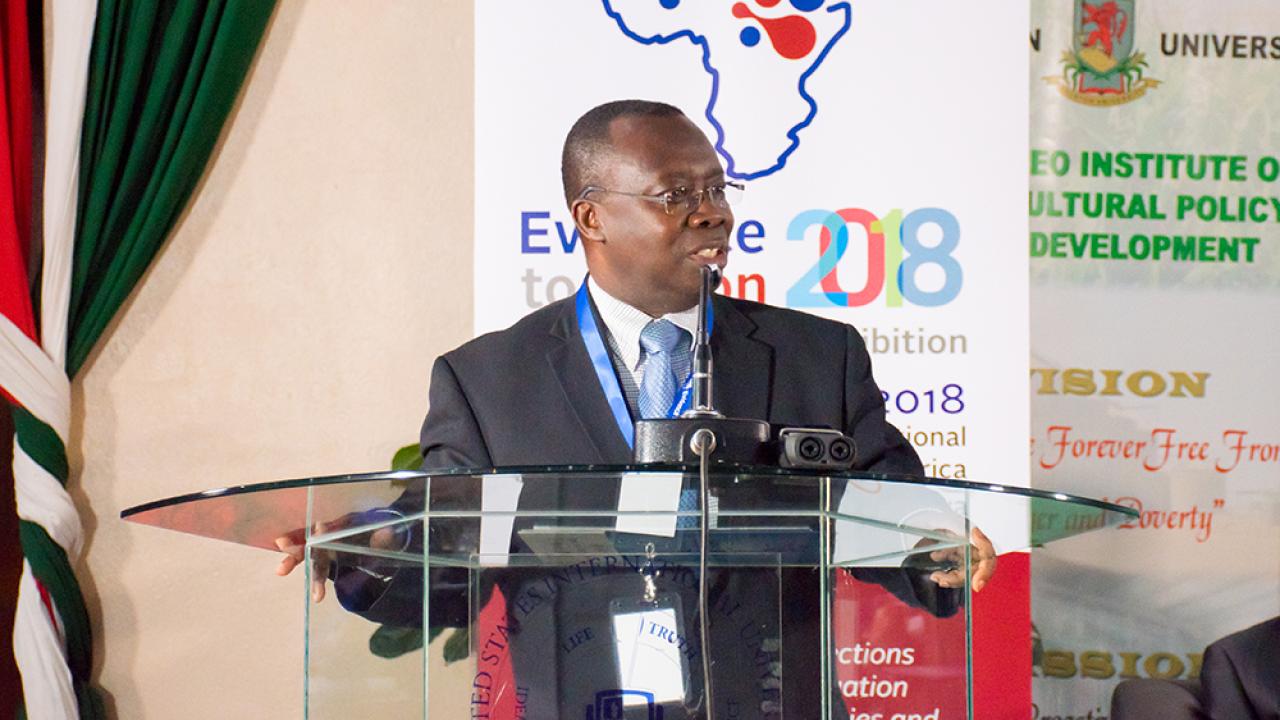
Africa-based Think Tank Event Highlights the Role of Evidence in Development Policy
The International Center for Evaluation and Development (ICED) conference on evidence for development policy, its third major policy event since the organization launched in 2017, is already having an impact on monitoring & evaluation.
More than 300 leaders from world governments, the donor community, researchers and the private sector participated in the ICED “Evidence to Action Conference 2018” in Nairobi, Kenya on July 24-25. Convened with support from the Feed the Future AMA Innovation Lab at UC Davis, the conference sought to enhance sustainable collaboration and knowledge sharing and to reinforce demand-driven, evidence-based policy.
“Without the confidence and firm belief that an Africa-based and African-led young think tank like ICED can organize and execute successful continent-wide conferences to promote the use of research and evaluation findings in support of national development agendas, the conference would have been a distance dream,” said David Ameyaw, founder and president of ICED and a member of the AMA Innovation Lab advisory board.
Policy Maker Announces Major Change to M&E in Kenya
The event was attended by representatives from the Government of Kenya, including National Treasury & Planning Cabinet secretary Henry Rotich, who gave the event’s keynote address. In his speech, Rotich announced a new National Monitoring and Evaluation (M&E) Policy in Kenya.
Kenya’s current efforts in M&E, a process of data collection and evaluation to measure the impact of development interventions, takes place from within the National Treasury. Under the new plan, an office dedicated to M&E will become an independent entity within the Government of Kenya funded at roughly KSH 6 billion (about USD 60 million).
“This new ministry of monitoring and evaluation is indicative of efforts in the region to use evidence to make better development policy,” said Michael Carter, director of the AMA Innovation Lab.
AMA Innovation Lab Research on Subsidies and ICT for Development
Carter led a panel discussion on development investments that get the greatest sustainable returns. “The programs that get a big bang for the buck are the ones that enable people to invest and build,” he said.
Carter discussed his research in Mozambique on temporary subsidies for fertilizer. In the study, temporary subsidies boosted fertilizer use by an average of 48 percent for the two years after the one-time subsidy was first distributed. In those years, maize yields were also 48 percent higher among those who used the subsidy.
“One way to think about subsidies is that they take away some of the risk for farmers to experiment with a new technology,” said Carter, “but you shouldn’t have to do that forever.”
AMA Innovation Lab researchers also presented on using information and communication technologies (ICT) for research data collection. Andrew Hobbs, a Ph.D. candidate at UC Davis, presented a tablet-based app he developed for an AMA Innovation Lab project that pairs a poverty graduation program with index-based livestock insurance.
The app Hobbs developed is a game that pastoralists can play on a digital tablet to learn how index insurance works. At the same time, the app collects data on the choices they make that can help researchers to design a more responsive index insurance contract.
Tim Njagi, a research associate at the Tegemeo Institute of Agricultural Policy and Development, presented on the role of ICT for collecting data, including its limitations.
“Using ICT for data collection is not a shortcut,” said Njagi. “You still need a strategic data management system.”
Africa-led Research on Monitoring & Evaluation and Development
ICED was launched in 2017 in Kenya to conduct research and to develop innovations for M&E and development. Its first major event, “East Africa Evidence to Action Conference” on May 23-24, 2017 in Nairobi, brought together over 200 delegates to discuss challenges and opportunities in the uptake of evidence-based research and evaluation by policy makers.
“In conjunction with national governments, international and national organization, donor agencies and others, the Evidence to Action Conference is now a regional convening in Africa,” said Ameyaw. “The aim is to advance the use of evidence-based policy making and development practices that will promote growth, transform lives and improve livelihoods on the continent.”
The 2018 event was given significant support by the AMA Innovation Lab with additional support from nine other institutions that include the Government of Kenya, the Campbell Collaboration, the Agriculture Technology Adoption Initiative (ATAI) at UC Berkeley, Tegemeo Institute and the Institute of Statistical, Social and Economic Research (ISSER) at the University of Ghana.
“With financial support, staff dedication and team commitment, the AMA Innovation Lab has been able to develop a mutual partnership with ICED and this has resulted in the institutionalization of the E2A Conference in Africa,” said Ameyaw. “It is a model partnership of mutual respect, accountability and responsibility to advance a common cause to influence change.”
